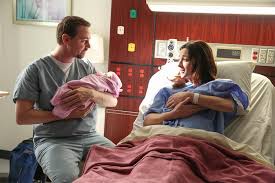
The Blue Blanket and the Ballistic Blues: When McGee Became a Dad (on an NCIS Case)
Timothy McGee had always been the responsible one, the moral compass, the guy who knew the technical manuals inside and out. He was the glue holding Gibbs’ team together, the voice of reason amidst the chaos. But "responsible" was a far cry from "father," and while he’d long imagined a future with Delilah, complete with the pitter-patter of tiny feet, he wasn't quite ready for fatherhood to slap him in the face during an NCIS investigation. That day, he discovered that "prepared" and "parent" were two very different concepts, and that even in the controlled environment of a crime scene, the primal instinct of fatherhood could ignite with surprising force.
The case was ugly. A marine, found dead in a dingy motel room, surrounded by needles and paraphernalia. The scene reeked of despair, a tragic ending to a life spiraling out of control. Gibbs, as usual, was all business, his steely gaze focused on the evidence, hunting for the truth beneath the squalor. DiNozzo, ever the jokester, was attempting to lighten the mood with his trademark movie references, but even his quips felt hollow in the face of such blatant waste. McGee, however, found himself strangely distracted.
It was a soft, rhythmic sound, barely audible above the hum of the forensic equipment. He followed it, drawn like a moth to a flame, towards a dilapidated crib tucked away in a shadowy corner. Inside, nestled amongst faded blankets, lay a baby girl, no older than a few months. Her tiny face was creased in sleep, her little chest rising and falling with a gentle rhythm.
The sight hit McGee like a ton of bricks. He knew intellectually that the marine had a family, that someone would be mourning him. But seeing the innocent child, utterly oblivious to the tragedy unfolding around her, triggered something deep within him. He felt a surge of protectiveness, a fierce urge to shield her from the grim reality of her situation.
Gibbs, sensing the change in McGee, approached him. "Report, McGee."
McGee, momentarily lost for words, simply pointed to the crib. Gibbs' face softened imperceptibly. "Notify Child Protective Services," he instructed. Then, with a gruffness that couldn't mask the concern in his voice, he added, "We need to find her mother."
That's when the case stopped being about ballistic reports and forensic evidence for McGee. It became about finding this child's mother, about ensuring her future, about giving her a chance at a life that wouldn't be defined by the choices of her parents. He poured over the marine's files, searching for any clue, any connection that would lead them to her. He worked tirelessly, driven by a newfound urgency.
DiNozzo, seeing McGee's focus, teased him relentlessly. "Probie's got baby fever! You gonna volunteer to babysit, McGee? Maybe sing her some lullabies written in binary code?"
But McGee ignored him. He was too consumed with the little girl in the crib, the one who needed someone to advocate for her. He even found himself gently straightening the blue blanket she was wrapped in, smoothing out the wrinkles with a tenderness that surprised even himself.
As the investigation progressed, they discovered the marine's girlfriend, a young woman struggling with addiction. When they finally located her, she was terrified, ashamed, and desperate. McGee saw in her eyes a reflection of his own fear – the fear of inadequacy, the fear of failing someone you love. He approached her with compassion, not judgment, assuring her that they were there to help, not to punish.
He witnessed her initial resistance, her heartbreaking admission that she didn't think she was fit to be a mother. But he also saw the glimmer of hope, the flicker of maternal instinct that still burned within her. He spoke to her about support groups, about rehabilitation programs, about the chance to rebuild her life for the sake of her child. He didn't preach, he simply listened and offered a hand.
In the end, with the help of social services, the young woman agreed to enter a treatment program. The baby girl was placed in temporary foster care, with the promise of reunification once her mother was clean and sober. As McGee watched them leave, he felt a mixture of relief and hope. He knew the road ahead would be difficult, but he had played a small part in giving them a chance.
That day, Timothy McGee didn't just solve a crime; he connected with a vulnerability he hadn't known he possessed. He discovered the raw, untamed instinct to protect and nurture, the primal urge to safeguard innocence. He may not have officially become a father on that NCIS case, but he learned what it meant to be one. He understood the weight of responsibility, the depth of love, and the enduring power of hope. He walked away from that motel room a changed man, more compassionate, more driven, and perhaps, just a little more ready for the day when he finally became a dad. And he knew, with a certainty that settled deep in his soul, that when that day came, he would be ready to smooth the wrinkles on his own child's blue blanket, ready to face the challenges and embrace the joys of fatherhood with open arms.